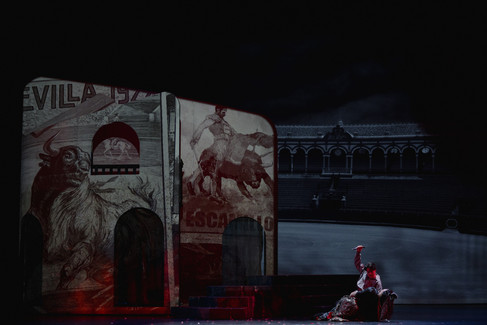Carmen
- lbremer14
- Dec 1, 2023
- 3 min read
Directed by: Fenlon Lamb

Music by: George Bizet
Libretto by: L. Halévy & H. Meilhac
Original Production
September 2023 - Opera Santa Barbara
Additional Production dates
October 2024 - Amarillo Opera
DESIGNERS
Dahl Delu - Set Designer
Daniel Chapman - Project Designer
Helena Kuuka - Lighting Designer
Stacie Louge - Costume Manager
ORIGINAL CAST
Kostis Protopapas - Conductor
Sarah Saturnino - Carmen
Nathan Granner - Don José
Anya Matanovic - Micaëla
Colin Ramsey - Escamillo
Director's Note
The source material for opera often presents a fascinating contrast to the dynamic and fluid interpretation of the finished musical composition. This holds especially true for Carmen as the characters are significantly simplified and softened through the musical and dramatic treatment. The novella by Prosper Merimée begins with a quote from Palladas: Every woman turns sour/Twice she has her hour/One is in bed/The other dead. It paints a violent and monstrous picture of sex and death in Seville. Carmen is a ferocious and wanton seductress while Don José and supporting characters are cast in a similar, ghastly light. Bizet and his librettists took this harsh world of cigarette girls, smugglers and thieves and created a sonorous study of the culture and customs in traditional opera comique form of the late 1800s. Carmen retains much of her instinctual character and sexual appeal while Don José manifests as a dutiful soldier with violent underpinnings. Ultimately, the opera offers a more relatable troupe of players.
Carmen’s powerful sexuality ebbs and flows throughout the opera. It is her only tool at a time when women were not allowed freedom or autonomy and she uses it boldly, without shame. From the first words of the Habañera, she declaims her untamed, passionate ideals. “Love is like a wild bird that no one can tame…if you love me, I don’t love you but if I love you, watch out!” Carmen’s open mindset and unfettered sexuality is an affront to conventional society; both the allure, and the problem posed by a passionate woman, possessed of limited resources. The musical underpinnings highlight Carmen’s playful, teasing nature as a creature of instinct and pragmatism conquering her current circumstances. This mellower version allows for an understanding and connection to the character. Even from our more contemporary viewpoint, we can route for this strong woman to overcome her circumstances and achieve the happily-ever-after ending.
In contrast, Don José is driven by a strict moral code as he grapples with the battle between the prohibitions of the super-ego and succumbing to his base desires. The manifestation of rule-governed behavior primarily as a compliant and dutiful soldier is an osmotic barrier that he continually penetrates and recoils from as he struggles to reconcile his feelings. Don José wrestles with his love for Micaëla and his lust for Carmen; mother and whore archetypes bounce within his brain. He pushes his base instincts and obsessive thoughts deeper and deeper inward. His loving remembrance of his homeland in the Act 1 duet with Micaëla turns to desperation and begging to be understood by Carmen in Act 2. As the character spirals downward, his utterances of Carmen’s name again and again show the obsession that will turn to unbridled rage against the woman who challenges everything he’s known before. It is more and more difficult to connect with his unhinged actions.
Tragically, the combination of these characters is much like “putting out fire with gasoline” to quote the late, great David Bowie. Their dynamic is purely combustible, resulting in a deadly outcome for Carmen. While the operatic treatment pulls back some from the novella’s nasty and lurid violence, there is no softening Carmen’s death at the hands of her maniacal lover. The fairy tale ending is not in the cards and she faces the ultimate test of her self-professed mantra: it is better to die than live imprisoned in the societal norm. She realizes, too late, that Don José will have the last word both literally and figuratively.
Reviews
"On the whole, the production heeds solid and conventional approaches to the material from stage director Fenlon Lamb and resourceful set designer Dahl Delu, who is abetted by Daniel Chapman’s atmospheric projection schemes (useful especially in the rugged smuggler’s mountain outpost scenes) and lighting designer Helena Kuukka.
Although following a traditional path, production-wise, OSB’s Carmen succeeded in that time-honored feat to be found at the opera, transporting us to another realm...Santa Barbara is fortunate to have a very fine opera operation, trustily providing that transportive service on a regular basis."
-Josef Woodward, Santa Barbara Independent
MEDIA











Comments